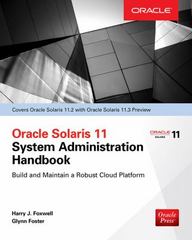Question
import java.util.regex.Matcher; import java.util.regex.Pattern; public class RegexMatches { public static void main(String args[]) { // String to be scanned to find the pattern. String line
import java.util.regex.Matcher; import java.util.regex.Pattern;
public class RegexMatches { public static void main(String args[]) {
// String to be scanned to find the pattern. String line = "This order was placed for QT3000! OK?"; String pattern = "(.*)(\\d+)(.*)";
// Create a Pattern object Pattern r = Pattern.compile(pattern);
// Now create matcher object. Matcher m = r.matcher(line); if (m.find()) { System.out.println("Found value: " + m.group(0)); System.out.println("Found value: " + m.group(1)); System.out.println("Found value: " + m.group(2)); } else { System.out.println("NO MATCH"); } } }
Step by Step Solution
There are 3 Steps involved in it
Step: 1

Get Instant Access to Expert-Tailored Solutions
See step-by-step solutions with expert insights and AI powered tools for academic success
Step: 2

Step: 3

Ace Your Homework with AI
Get the answers you need in no time with our AI-driven, step-by-step assistance
Get Started


